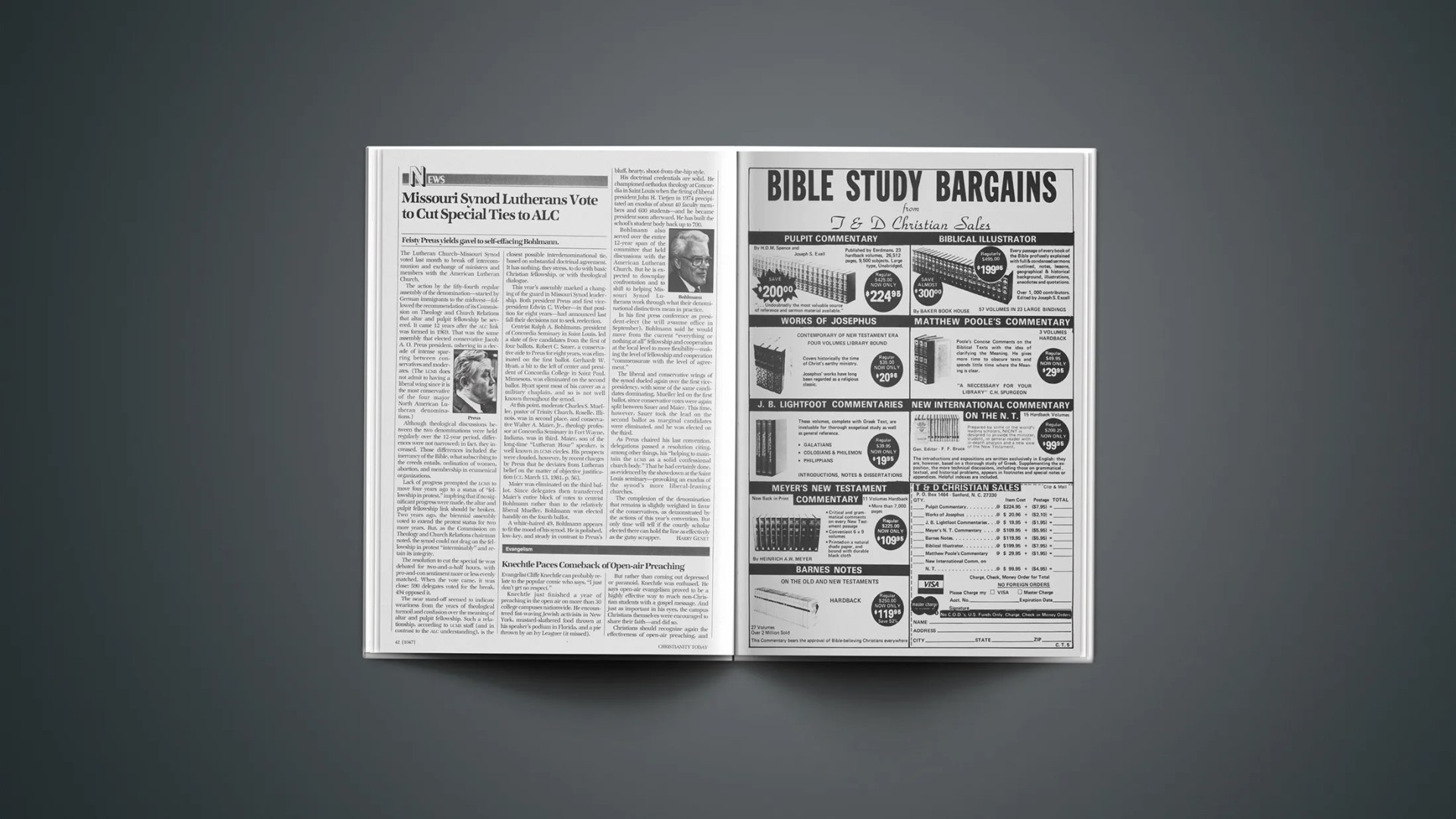Evangelist Cliffe Knechtle can probably relate to the popular comic who says, “I just don’t get no respect.”
Knechtle just finished a year of preaching in the open air on more than 30 college campuses nationwide. He encountered fist-waving Jewish activisits in New York, mustard-slathered food thrown at his speaker’s podium in Florida, and a pie thrown by an Ivy Leaguer (it missed).
But rather than coming out depressed or paranoid, Knechtle was enthused. He says open-air evangelism proved to be a highly effective way to reach non-Christian students with a gospel message. And just as important in his eyes, the campus Christians themselves were encouraged to share their faith—and did so.
Christians should recognize again the effectiveness of open-air preaching, and not write it off as an archaic throwback to the John Wesley era, he feels.
Knechtle recently spent a week at Ball State University in Muncie, Indiana, in conjunction with evangelist Leighton Ford’s campaign there. Weather permitting, Knechtle preached outside to groups of from 10 to 100 on relevant student topics: stress, sex, success. Question and answer periods that followed—central to all Knechtle’s open-air meetings—sometimes lasted several hours. He also held nightly meetings in various dormitories. A singer helped draw a crowd, then Knechtle opened up with a message and the discussion periods.
Even skeptical Ball State students commented about Knechtle’s sincerity—his honesty in saying so, for instance, if he didn’t know the answer to a tough question. A Leighton Ford staff member observed, “Open-air preachers have been around for years, but Knechtle does it with intelligence.”
Knechtle, 27, an InterVarsity Christian Fellowship staff member who attends the First Baptist Church in Sudbury, Massachusetts, when he’s not traveling, goes only to campuses where Christian student groups have invited him. Organizers clear Knechtle’s activities with the school administration, and Christian students provide on-campus publicity. These steps lead to a campus awareness that “this is not just some guy coming in on his own and starting to wing it, but something that has been planned by the Christians on campus,” he says.
Knechtle relies heavily on the support of Christian students. He asks some to gather at the spot where he’s preaching—always a place with high student traffic. They create a crowd feel and thereby help attract other listeners. But they also intend to share their faith one-to-one with other listeners who have gathered, asking, as a springboard, for reactions to what Knechtle is saying.
Also, Knechtle asks these Christians beforehand to “break the ice” by asking a first question during the discussion period. For instance, at Wheaton (Massachusetts) College, an all-girls’ school, a Christian asked Knechtle to explain Paul’s view of women in the New Testament: an initial group of 5 students soon grew to 60, including some professors.
A time for questions is essential to open-air preaching, Knechtle says. This counteracts the stereotype of the “fire-and-brimstone preacher” who demands an immediate decision, or who seems to manipulate. A preacher should listen, not just talk, Knechtle believes, and he says students have told him they appreciate his vulnerability.
Listeners have made Christian commitments at the meetings. But Knechtle says the involvement and resultant strengthening of Christian students at the open-air meetings is nearly as important. Open airpreaching “breaks the sound barrier,” he says, by creating a setting for a one-to-one witness between persons in his audience.
What’s more, Knechtle says, “When the Christians begin hearing Christ called four-letter words … and the battle gets out into the open, closet Christians are forced to take a stand either with Christ or away from him.”
Knechtle also says there’s a confidence boost: “Christians who have been intimidated intellectually, psychologically, even physically, are beginning to see the gospel can stand in the marketplace, and that we don’t have to apologize intellectually for our faith in Christ.”
That the open-air meetings sometimes unite Christians was shown at Western Illinois University, where the IVCF chapter grew from 5 to 20 members after Knechtle’s time there.
Knechtle began to pray for preaching invitations several years ago while a student at Gordon-Conwell Seminary. When none came, he felt led to witness one-to-one and in bars in downtown Boston. Other seminarians later joined him in his bar-preaching outreach.
After Knechtle’s graduation from Gordon two years ago, IVCF invited him onto the staff as a campus evangelist. But after a time of speaking in student unions where “99.9 percent of the audience was Christian,” Knechtle thought there had to be a better way. He gave open-air preaching a test run a year ago during IVCF beach evangelism in Fort Lauderdale, Florida. Since then, his open-air preaching opportunities have taken off.
But is open-air preaching too unsophisticated for the college crowd and other listeners? “Oh, that’s easy,” Knechtle said. “People are so sick and tired of the slick put-on, the super-shiny production. They want to see people who really believe in something enough to become vulnerable, who will stand up and have people take potshots at them, who will stand there and not respond in hatred or seek revenge, but in love, tell about Christ.”
Corresponding Issue










